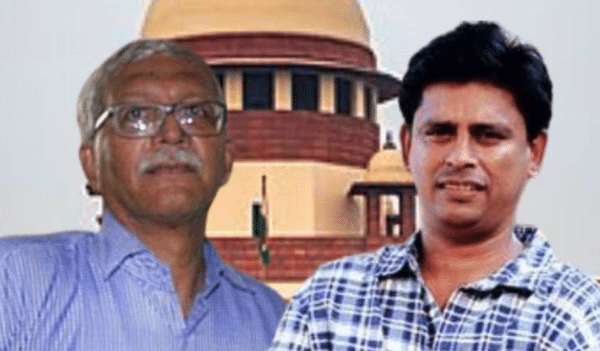Over five years after rights activists Vernon Gonsalves and Arun Ferreira were arrested for their alleged role in the Elgar Parishad case, the Supreme Court of India today, July 28, ordered for their release on bail.
The division bench of Justices Aniruddha Bose and Sudhanshu Dhulia observed that the material evidence available against Gonsalves and Ferreira “does not justify their continuous detention”.
Booked under the the Unlawful Activities (Prevention) Act, 1967, Gonsalves and Ferreira had moved the apex court last year. Their bail applications had earlier been rejected by the special NIA court and the Bombay high court. Senior lawyers Rebecca John and R. Basant had highlighted the inordinate delay in the commencement of trial in the case as one of the main grounds in the bail plea.
The court today, while granting them bail, said,
Considering the fact that almost five years have lapsed since they (Gonsalves and Ferreira) were taken into custody… the appellants have made out a case for granting of bail.
The lawyers had also pointed to the lack of evidence against the arrested accused.
“It has been a long wait for Arun and the family. We are happy with the news,” Ferreira’s wife Jennifer told The Wire.
A controversial case and investigation
The Elgar Parishad case, registered by the Pune police in January 2018 and later handed over to the National Investigating Agency in 2020, has been mired in controversy since the very start. While the state had initially claimed that 16 persons–including Gonsalves and Ferreira–played an active role in “provoking” the gathered crowd at Bhima Koregaon with their speeches and triggering violence on the 200th-anniversary celebration of the battle of Bhima Koregaon, they were later accused of being “urban Naxals”.
The claims of their alleged association with the banned CPI (Maoist) organisation is based on purported emails and other evidence allegedly retrieved from the electronic devices belonging to the accused. These claims, however, have been challenged by many independent forensic organisations.
One such investigation by The Wire and partner news organisations revealed that at least nine numbers belonged to eight activists, lawyers and academics accused in the case were either persons of interest or forensically identified as having been targeted by clients of the NSO Group’s Pegasus spyware. A Massachusetts-based digital forensics firm, Arsenal Consulting had later confirmed at least one phone–belonging to prisoners’ rights activist Rona Wilson–was definitely infected by the malicious spyware.
Among those arrested in connection with the Elgar Parishad case are Sudhir Dhawale, a writer and Mumbai-based Dalit rights activist; Mahesh Raut, a young activist from Gadchiroli who worked on displacement; Shoma Sen, who had been head of the English literature department at Nagpur University; advocates Arun Ferreira and Sudha Bharadwaj; writer Varavara Rao; activist Vernon Gonsalves; prisoners’ rights activist Rona Wilson; Surendra Gadling, a UAPA expert and lawyer from Nagpur; tribal rights activist the late Father Stan Swamy; Delhi University professor Hany Babu, scholar; academic Anand Teltumbde; civil liberties activist Gautam Navlakha; and members of the cultural group, Kabir Kala Manch: Sagar Gorkhe, Ramesh Ghaichor and Jyoti Jagtap.
Teltumbde, Bharadwaj and Rao are out on bail, but Swamy died last year allegedly due to the state’s negligence and failure to provide him with adequate medical care.
Two other accused persons – Sen and Jagtap–have also moved the Supreme Court. The court is likely to decide on their application in the coming months.
While reading out the operative part of the order, the judges said that Gonsalves and Ferreira are both granted conditional bails. Gonsalves’s prior conviction and the seriousness of the charges were taken into consideration, the court stated. Both accused have been directed to not leave Maharashtra, hand over their passports, use only one mobile phone and keep the investigating officer in the case updated about their places of residence. Additional restrictions, if any, are to be added by a trial court, the SC said.

